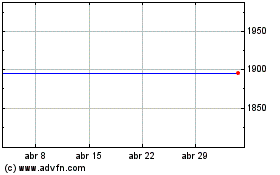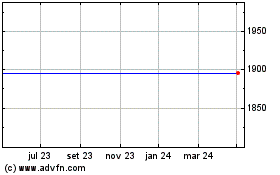Shell Swings to Historic Loss as Pandemic Devastates Oil Demand -- Update
30 Julho 2020 - 9:43AM
Dow Jones News
By Sarah McFarlane
Royal Dutch Shell PLC swung to its first quarterly loss since
its formation over a decade ago and warned that the outlook for
oil-and-gas demand continued to be uncertain, illustrating the
scale of damage Covid-19 is wreaking on the industry.
The pandemic has decimated demand for oil, hitting prices hard.
When around two-thirds of the world's population was in lockdown in
early April, global oil demand fell by a third, according to the
International Energy Agency.
That led Shell to report Thursday a second-quarter loss on a net
current-cost-of-supplies basis -- a figure similar to the net
income that U.S. oil companies report -- of $18.4 billion. That
compares to a profit of $3 billion in the comparable period last
year and is the company's first loss since the unification of Royal
Dutch Petroleum and Shell Transport and Trading in 2005.
The Anglo-Dutch company's performance was partly hit by it
writing down the value of its assets by $22 billion before tax, as
flagged in June, reflecting expectations of lower energy
prices.
About half the charge was attributed to its gas business --
mainly its Australian liquefied natural gas projects. It also wrote
down the value of two shale assets in North America and offshore
assets in Brazil, Europe, Nigeria and the Gulf of Mexico.
Shell warned that the uncertain outlook for oil and gas demand
could curtail its production in the third quarter, as well as
activity at its refineries and chemicals plants. It also said its
LNG business would suffer a greater impact from lower oil prices in
the third quarter because of the time lag for price moves reaching
oil-linked LNG contracts.
Benchmark Brent oil prices averaged $29.60 a barrel between
April and June, down 57% from the comparable period a year earlier.
Brent traded at $43.78 a barrel Thursday.
"There remains continued significant uncertainty in terms of how
the pandemic will play out, we're seeing a lot of starting and
stopping around the world, that impacts our assets, our supply
chains," said Jessica Uhl, Shell's chief financial officer.
The company is restructuring to become simpler, leaner and more
focused, Ms. Uhl said, without elaborating on whether this could
result in Shell selling any businesses. Efforts to reduce costs
include a voluntary redundancy program, although the company didn't
say how many roles could be cut. Shell employs around 83,000
people.
"A major overhaul is required, working out what's core and
noncore, in the context of whether they want to be in all markets
or exit some businesses," said Christyan Malek, an analyst at JP
Morgan.
French energy company Total SA also reported a quarterly loss
Thursday, but said it would maintain its dividend. Its earnings
came a day after it wrote down the value of its assets by $8.1
billion because of lower oil price expectations. Still, Total said
that while its European gas stations saw a 30% fall in demand for
petroleum products in the quarter, by June it had rebounded to 90%
of precrisis levels.
Both Shell and Total noted the strength of their trading
activities, which can make money even when energy prices are lower
by taking advantage of price volatility. Ms. Uhl said it was one of
Shell's best trading performances on record.
The two European companies are the first of the five major oil
companies to detail the damage the pandemic has inflicted during
the second quarter.
U.S. giants Exxon Mobil Corp. and Chevron Corp. are expected to
report quarterly losses Friday, with Exxon warning recently that it
faced steep losses in its refining and production businesses.
Oil companies have taken swift action to shore up their finances
since coronavirus struck, including cutting costs and reducing
staff. Shell has been among the most aggressive, deciding in April
to cut its dividend for the first time since World War II to avoid
having to borrow to fund it.
The company said that as its earnings recover it would look to
increase dividends, expand investment to enable growth and reduce
debt.
Shell said Thursday that its gearing level -- net debt as a
percentage of total capital -- rose to around 33%, above the
company's target of 25%. In April Shell's gearing was 29%. Higher
gearing can raise the cost of borrowing for a company.
Both Exxon and Chevron have said they are committed to not
cutting dividends, but have taken on more debt this year. Analysts
expect BP PLC to cut its payout to shareholders when it reports
earnings Tuesday.
Shell's shares traded down 2.7% on Thursday.
Christopher M. Matthews
contributed to this article.
Write to Sarah McFarlane at sarah.mcfarlane@wsj.com
(END) Dow Jones Newswires
July 30, 2020 08:28 ET (12:28 GMT)
Copyright (c) 2020 Dow Jones & Company, Inc.
Shell (LSE:RDSA)
Gráfico Histórico do Ativo
De Mar 2024 até Abr 2024

Shell (LSE:RDSA)
Gráfico Histórico do Ativo
De Abr 2023 até Abr 2024
